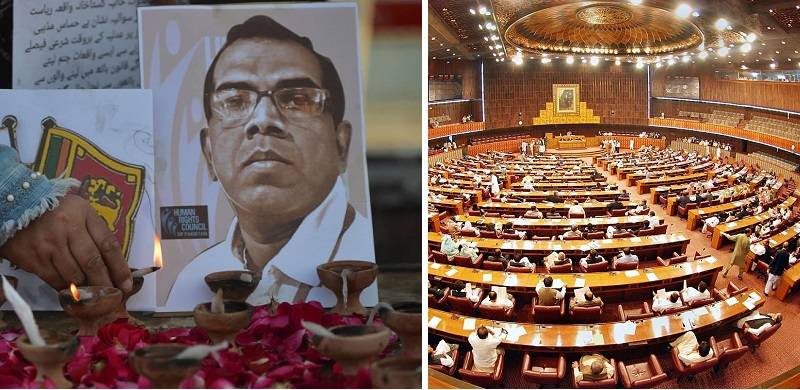
The Senate of Pakistan has passed a resolution unanimously condemning the incident where a Sri Lankan national Priyantha Kumara was lynched in Sialkot earlier this month. Senate Chairman Sadiq Sanjrani announced that the upper house of parliament would send a delegation of senators to Sri Lanka to provide a copy of the resolution to Kumara’s family and convey condolences.
Kumara had lived and worked in Pakistan for 11 years. He was beaten, killed and later set on fire by a violent mob in Sialkot. He had been accused of blasphemy for removing a poster with religious content. It was later revealed that Kumara was falsely accused of blasphemy by workers of the factory
The Senate resolution, moved by Leader of the House Shahzad Waseem, called upon the government of Pakistan to take action against those involved in the lynching of Kumara. It also claimed that religion in Pakistan had nothing to do with such violence. A number of Senators from the government and opposition alike spoke on the rising tide of extremism in the country and the misuse of blasphemy-related legislation. Opposition senators including Senator Raza Rabbani of the PPP highlighted what they saw as the state’s complicity in the rise of such an extremist mindset.
Kumara had lived and worked in Pakistan for 11 years. He was beaten, killed and later set on fire by a violent mob in Sialkot. He had been accused of blasphemy for removing a poster with religious content. It was later revealed that Kumara was falsely accused of blasphemy by workers of the factory
The Senate resolution, moved by Leader of the House Shahzad Waseem, called upon the government of Pakistan to take action against those involved in the lynching of Kumara. It also claimed that religion in Pakistan had nothing to do with such violence. A number of Senators from the government and opposition alike spoke on the rising tide of extremism in the country and the misuse of blasphemy-related legislation. Opposition senators including Senator Raza Rabbani of the PPP highlighted what they saw as the state’s complicity in the rise of such an extremist mindset.

